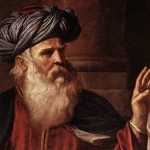by Fr. Patrick Henry Reardon
 As types of Christ our Intercessor with the Father, the Old Testament speaks of several men who were efficacious in intercession. Three of these are Abraham, Moses, and Job. In the case of Abraham, God affirmed his standing as an intercessor when He told the offending Abimelech that Abraham
As types of Christ our Intercessor with the Father, the Old Testament speaks of several men who were efficacious in intercession. Three of these are Abraham, Moses, and Job. In the case of Abraham, God affirmed his standing as an intercessor when He told the offending Abimelech that Abraham
“will pray for you and you shall live.”
And, indeed,
“Abraham prayed to God; and God healed Abimelech.”
As God’s friend, Abraham was blessed with what the Bible calls parresia, which means, confidence or even boldness. Abraham could be rather persistent when he brought some point of concern to the attention of the Almighty. As a Middle Eastern Bedouin, accustomed to mercantile dickering, Abraham knew how to chaffer his way to a bargain, and he incorporated this skill too into his prayer, as it were.
Genesis 18 provides the evidence for this trait, declaring that Abraham, knowing of God’s plan to destroy Sodom, feared that his own nephew, Lot, might perish. Accordingly, he, summoned all his mental resources to discourage the Almighty’s pursuit of the plan. He commenced by asking a perfectly reasonable question having to do with the nature of the divine justice:
“Would You also destroy the righteous with the wicked?”
God wouldn’t, of course; the question itself was rhetorical. Thus, Abraham the haggler had already intruded his foot into God’s doorway. Then, step-by-step, he haggled God down to a mere tithe of the original figure.
In the case of Moses, Holy Scripture speaks of three instances demonstrating his intercessory powers: his prayer on the hill while Joshua and the army defeated Amalek in the valley, his pleading on Mount Sinai during the incident of the Golden Calf, and petition in the desert for the healing of Miriam
Arguably the most significant of these instances is that on Mount Sinai, with its a two-leveled scene: Moses is on top of Mount Sinai with God, while Aaron is down in the valley with the Israelites. Just prior to the prayer, two things have been transpiring simultaneously, both of them having to do with Aaron. On the mountain Moses has been receiving from the Lord a series of ordinances and statutes governing the consecration, vestments, liturgical instruments, and other matters concerning the Aaronic priesthood (Exodus 25-31).
The irony is this: Aaron is about to be consecrated Israel’s priest; he is to take on that intercessory ministry of which Holy Scripture says,
“every high priest taken from men is appointed for things pertaining to God on behalf of the people, to offer both gifts and sacrifices for sins” (Hebrews 5:1).
But before any of this happens, Aaron falls away, so that no sacrifice for sins can be offered. Instead, Moses turns away God’s anger by a prayer of supplication, a prayer that includes his offer to be sacrificed so that the sins of the people might be pardoned. He prays,
“Yet now, if only You would forgive their sin . . . but if not, I pray, blot me out of Your book You have written.”
This prayer is more than a bare intercession; it is Moses’ generous self-offering by an association of himself with the people’s guilt.
The prayer of Moses, in which he deliberately associates himself with the guilt of the people, demonstrates an important quality of intercessory prayer. The intercessor never stands apart from the state of those for whom he prays. Moses’ wish to be blotted from God’s book rather than see the Israelites perish is repeated in the soul of St. Paul, who wrote of those same Israelites:
“I could wish that I myself were accursed from Christ for my brethren, my countrymen according to the flesh” (Romans 9:3).
In the case of Job, the Lord instructs his three friends,
“Now therefore, take for yourselves seven bulls and seven rams, go to My servant Job, and offer up for yourselves a burnt offering; and My servant Job shall pray for you. For I will accept him, lest I deal with you according to your folly; because you have not spoken of Me what is right, as My servant Job has.”
These men
“did as the Lord commanded them; for the Lord had accepted Job.”
This aspect of Job was not lost on earlier readers of the book. For example, the Prophet Ezekiel, remembering Job’s prayer more than his patience, listed him with Noah and Daniel, all three of whom he took to be men endowed with singular powers of intercession before the Most High (Ezekiel 14:14-20).
